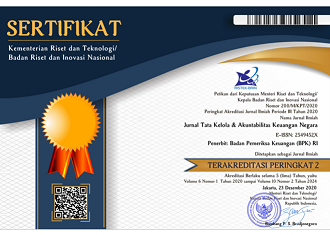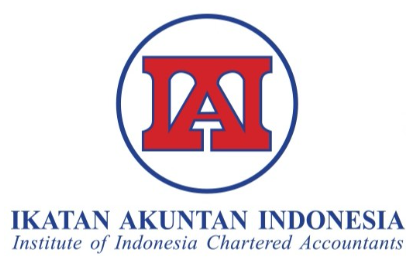The Effectiveness of Investigative Audit: Role of Whistleblowing System in Disclosing Fraud in Yogyakarta, Indonesia
DOI:
https://doi.org/10.28986/jtaken.v8i2.1106Keywords:
whistleblowing system, investigative audit, fraud, disclosureAbstract
This study aims to analyze the whistleblowing system’s effect on fraud disclosure with the effectiveness of investigative audits as a mediator. Data collection was conducted by distributing questionnaires to the functional employee of Yogyakarta’s Inspectorate comprising auditors and Government Affairs Supervision in the Regions (Pengawas Penyelenggaraan Urusan Pemerintahan di Daerah, P2UPD). Data analysis was conducted using WarpPLS, with research results proving that the whistleblowing system significantly impacts fraud disclosure and the effectiveness of investigative audits. Furthermore, it will prove that the effectiveness of investigative audits significantly affects fraud disclosure and mediates the whistleblowing system’s effect on fraud disclosure. The result implies that optimizing the supporting factors in the whistleblowing system and the investigative audit examination process can improve fraud disclosure in Yogyakarta.
References
Abyan, D. (2019). Pengaruh kemampuan auditor dan whistleblowing system terhadap efektivitas audit investigatif (survey pada auditor Badan Pengawasan Keuangan dan Pembangunan Provinsi Jawa Barat). (Thesis). Pasundan University, West Java, Indonesia. Retrieved from http://repository.unpas.ac.id/41520/
ACFE. (2008). Report to the Nation. Retrieved from https://www.acfe.com/-/media/files/acfe/pdfs/2008-rttn.ashx
ACFE Indonesia Chapter. (2019). Survei Fraud Indonesia 2019. Retrieved from https://www.acfe.com
Ajzen, I. (1991). The theory of planned behavior. Organizational Behavior and Human Decision Process, 50(2), 179-211. DOI: 10.1016/0749-5978(91)90020-T
Ajzen, I. (2005). Laws of human behavior: Symmetry, compatibility, and attitude-behavior correspondence. Multivariate Research Strategies, 3-19.
Andriani., Rahmawati., & Kasran, M. (2020). Pengaruh akuntansi forensik dan audit investigasi terhadap pengungkapan fraud (studi pada kantor BPKP di Kota Makassar). (Thesis). Universitas Muhammadiyah Palopo, South Sulawesi, Indonesia. Retrieved from http://repository.umpalopo.ac.id/392/
Anggriawan, E. F. (2014). Pengaruh pengalaman kerja, skeptisme profesional dan tekanan wantu terhadap kemampuan auditor dalam mendeteksi fraud (studi empiris pada Kantor Akuntan Publik di DIY). Jurnal Nominal, 3(2), 101-116. DOI: 10.21831/nominal.v3i2.2697
Baron, R. M., & Kenny, D. A. (1986). The moderator-mediator variable distinction in social psychological research: Conceptual, strategic, and statistical considerations. Journal of Personality and Social Psychology, 51(6), 1173-1182.
BPK RI. (2017). BPK Regulation Number 1 Year 2017 concerning State Financial Audit Standards (Peraturan BPK RI Nomor 1 Tahun 2017 tentang Standar Pemeriksaan Keuangan Negara). Retrieved from https://www.bpk.go.id/ page/standar-pemeriksaan-keuangan –negara
BPKP. (2017). BPKP Regulation Number 17 Year 2017 concerning Guidelines for Management of Investigations (Peraturan BPKP RI Nomor 17 tahun 2017 tentang Pedoman Pengelolaan Bidang Investigasi). Retrieved from https://www.bpkp.go.id/public/upload/unit/investigasi/files
Brief, A., & Motowidlo, S. J. (1986). Prosocial organizational behaviors. The Academy of Management Review, 11(4), 710-725.
Chin, W. W. (1998). The partial least squares approach for structural equation modeling. in G. A. Marcoulides (Ed.). Modern methods for business research (pp.295-236). London: Lawrence Erlbaum Associates.
Crowe, H. (2011). IIA Practice Guide: Fraud and Internal Audit. Retrieved from http://aiba-us.org/wpcontent/uploads/ 2011/04/2010 0922AIBAFraud.pdf.
Hair, J., Black, W., Babin, B., Anderson, R., & Tatham, R. (2006). Multivariate data analysis (6th ed.). Upper Saddle River, NJ: Pearson Prentice Hall.
Hamilah., & Sihotang, K. F. (2020). The influence of internal auditors, internal control systems, whistleblowing systems, and organizational commitment to fake prevention (fraud). Palarch’s Journal of Archaeology of Egypt/Egyptology, 17(6), 7119-7131.
Hasana. (2018). Pengaruh sikap auditor forensik, kemampuan dan pengalaman auditor investigatif terhadap efektivitas pelaksanaan prosedur audit dalam pengungkapan fraud. (Master’s Thesis). Universitas Islam Indonesia, Yogyakarta, Indonesia. Retrieved from https://dspace.uii.ac.id/handle/123456789/ 6573
Hayes, R., Dassen, R., Schilder, A., & Wallage, P. (2005). Principles of auditing: An introduction to international standards of auditing. (Second Ed.). Harlow: Pearson Prentice Hall.
Henseler, J., & Sarstedt, M. (2013). Goodness-of-fit indices for partial least squares path modeling. Computational Statistic, 28, 565-580.
Indonesia Corruption Watch. (2019). Laporan akhir tahun ICW 2019. Retrieved from https://antikorupsi.org/id/article/laporan-akhir-tahun-icw-2019
Khafid, S. (2020, December). Selama 2020, Nilai Korupsi di DIY Capai Rp23 Miliar Lebih. Harian Jogja. Retrieved from https://jogjapolitan.harianjogja.com/
KNKG. (2008). Pedoman Sistem Pelaporan Pelanggaran - SPP (Whistleblowing System). Jakarta: Komite Nasional Kebijakan Governance.
Rahmida, M. (2020). Pengaruh whistleblowing system terhadap efektivitas audit forensik dan audit investigasi dalam mendeteksi fraud dengan moderasi gender dan pengalaman. (Master’s Thesis). Universitas Islam Indonesia, Yogyakarta, Indonesia. Retrieved from https://dspace.uii.ac.id/handle/123456789/20670
Restianto, Y. E., Sudibyo, Y. A., Qosasi, A., & Suwarno. (2021). The implementation of Benford’s law to detect indications of corruption patterns in government institutions. Jurnal Tata Kelola dan Akuntabilitas Keuangan Negara, 7(2), 131-149. DOI: 10.28986/jtaken.v7i2.740
Rizkianti, K. M., & Purwati, A. S. (2020). Factors affecting intention on whistleblowing with anonymous reporting as moderating variable. International Journal of Accounting, Tax, and Business, 1(1), 1-14.
Rokhmawati, N. D. (2018). Hubungan kemampuan auditor, skeptisme profesional auditor dan whistleblower dengan efektivitas pelaksanaan audit investigatif dalam pengungkapan kecurangan pada BPKP Perwakilan Provinsi Jawa Timur. (Thesis). Universitas Sunan Ampel, East Java, Indonesia. Retrieved from http://digilib.uinsby.ac.id/25486/
Sari, D. (2021). Professionalism auditor and whistleblowing system against fake prevention (case study at PT. KAI Bandung). Review of International Geographical Education (RIGEO), 11(3), 1284-1292. DOI:10.48047/rigeo.11.3.119
Syahputra, B. E., & Urumsah, D. (2019). Deteksi fraud melalui audit pemerintahan yang efektif: analisis multi-grup gender dan pengalaman. Jurnal Akuntansi dan Binsis, 19(1), 31-42. DOI: 10.20961/jab.v19i1.319
Ulimsyah, U. (2021). Whistleblowing's effectiveness in preventing fraud through forensic audit and investigative audit. Point of View Research Accounting and Auditing, 2(1), 81-91.
Downloads
Submitted
Accepted
Published
How to Cite
Issue
Section
License

Jurnal Tata Kelola dan Akuntabilitas Keuangan Negara is licensed under
a Creative Commons Attribution-ShareAlike 4.0 International License




















